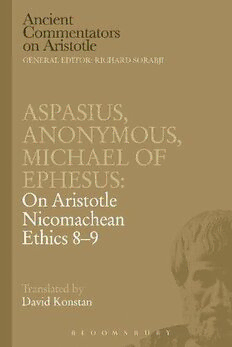Download Aspasius, Michael of Ephesus, Anonymous: On Aristotle Nicomachean Ethics 8-9 PDF Free - Full Version
Download Aspasius, Michael of Ephesus, Anonymous: On Aristotle Nicomachean Ethics 8-9 by David Konstan in PDF format completely FREE. No registration required, no payment needed. Get instant access to this valuable resource on PDFdrive.to!
About Aspasius, Michael of Ephesus, Anonymous: On Aristotle Nicomachean Ethics 8-9
Aristotle devotes books 8-9 of the Nicomachean Ethics to friendship, distinguishing three kinds: a primary kind motivated by the other’s character; and other kinds motivated by utility or pleasure. He takes up Plato’s idea that one knows oneself better as reflected in another’s eyes, as providing one of the benefits of friendship, and he also sees true friendship as modelled on true self-love. He further compares friendship with justice, and illustrates the ubiquity of friendship by referring to the way in which we help wayfarers as if they were kin (oikeion), a word he takes from Plato’s discussion of love. In many of these respects he probably influenced the Stoic theory of justice as based on the natural kinship (oikeiotes) one feels initially for oneself at birth and, eventually, for lost wayfarers. Of the three commentaries translated here, that by the second-century AD Aristotelian Aspasius is the earliest extant commentary on Aristotle; the second is by Michael of Ephesus in the twelfth century; the third is of unknown date and authorship. Aspasius worries whether there is only one kind of friendship with a single definition.But he plumps for a verdict not given by Aristotle, that the primary kind of friendship serves as a focal point for defining the other two. Aspasius picks up connections with his Stoic contemporaries. Michael cites Christians and draws from Neoplatonists the idea that there is a self-aware part of the soul, and that Aristotle saw individuals as bundles of properties.
Detailed Information
| Author: | David Konstan |
|---|---|
| Publication Year: | 2001 |
| ISBN: | 9781780939094 |
| Pages: | 248 |
| Language: | English |
| File Size: | 1.671 |
| Format: | |
| Price: | FREE |
Safe & Secure Download - No registration required
Why Choose PDFdrive for Your Free Aspasius, Michael of Ephesus, Anonymous: On Aristotle Nicomachean Ethics 8-9 Download?
- 100% Free: No hidden fees or subscriptions required for one book every day.
- No Registration: Immediate access is available without creating accounts for one book every day.
- Safe and Secure: Clean downloads without malware or viruses
- Multiple Formats: PDF, MOBI, Mpub,... optimized for all devices
- Educational Resource: Supporting knowledge sharing and learning
Frequently Asked Questions
Is it really free to download Aspasius, Michael of Ephesus, Anonymous: On Aristotle Nicomachean Ethics 8-9 PDF?
Yes, on https://PDFdrive.to you can download Aspasius, Michael of Ephesus, Anonymous: On Aristotle Nicomachean Ethics 8-9 by David Konstan completely free. We don't require any payment, subscription, or registration to access this PDF file. For 3 books every day.
How can I read Aspasius, Michael of Ephesus, Anonymous: On Aristotle Nicomachean Ethics 8-9 on my mobile device?
After downloading Aspasius, Michael of Ephesus, Anonymous: On Aristotle Nicomachean Ethics 8-9 PDF, you can open it with any PDF reader app on your phone or tablet. We recommend using Adobe Acrobat Reader, Apple Books, or Google Play Books for the best reading experience.
Is this the full version of Aspasius, Michael of Ephesus, Anonymous: On Aristotle Nicomachean Ethics 8-9?
Yes, this is the complete PDF version of Aspasius, Michael of Ephesus, Anonymous: On Aristotle Nicomachean Ethics 8-9 by David Konstan. You will be able to read the entire content as in the printed version without missing any pages.
Is it legal to download Aspasius, Michael of Ephesus, Anonymous: On Aristotle Nicomachean Ethics 8-9 PDF for free?
https://PDFdrive.to provides links to free educational resources available online. We do not store any files on our servers. Please be aware of copyright laws in your country before downloading.
The materials shared are intended for research, educational, and personal use in accordance with fair use principles.

